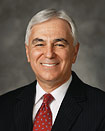Obedience to the Prophets, by Claudio R. M. Costa
Of the Presidency of the Seventy

If you were to ask what distinguishes the doctrine of Church of Jesus Christ of Latter-day Saints from that of the bulk of Christianity, you may get three predominant answers: 1.) that the Book of Mormon is another testament of Jesus Christ; 2.) that the Church is led by living prophets; and that 3.) there are three separate persons in the Godhead: God, the Eternal Father; his Son, Jesus Christ; and the Holy Ghost.
Elder Costa's remarks focused on the second of these: prophets. In fact, if you were a habitual counter, you would mark 51 times that the word "prophet" occurs in his talk! (That's 3.4 percent of the words in his talk.)
Like Elder Costa, I remember studying Joseph Smith's history (link). I, too, read, pondered, and prayed, and received a witness that Joseph Smith was truly a prophet. After recounting his testimony of prophets, he asked a question:
Why is it important to have living prophets to guide the true Church of Jesus Christ and its members?
By way of answering, Elder Costa recounted points from a "powerful message about obedience to the prophets" that [then] Elder Ezra Taft Benson gave at a BYU devotional. The talk is titled, "Fourteen Fundamentals in Following the Prophet" (audio, pdf). As I repeat the points here, consider which are your favorites, and why:
- The prophet is the only man who speaks for the Lord in everything.
- The living prophet is more vital to us than the standard works.
- The living prophet is more important to us than a dead prophet.
- The prophet will never lead the Church astray.
- The prophet is not required to have any particular earthly training or credentials to speak on any subject or act on any matter at any time.
- The prophet does not have to say ‘Thus saith the Lord’ to give us scripture.
- The prophet tells us what we need to know, not always what we want to know
- The prophet is not limited by men’s reasoning.
- The prophet can receive revelation on any matter—temporal or spiritual.
- The prophet may be involved in civic matters.
- The two groups who have the greatest difficulty in following the prophet are the proud who are learned and the proud who are rich.
- The prophet will not necessarily be popular with the world or the worldly.
- The prophet and his counselors make up the First Presidency—the highest quorum in the Church.
- The prophet and the presidency—the living prophet and the first presidency—follow them and be blessed; reject them and suffer.
As I reviewed these points and Elder Costa's commentary on them, the few that stood out the most to me are (Note: quotes are from Benson's address):
Living prophets are more important than dead prophets
Many doctrinal arguments can easily be settled by an appeal to the words of the living prophets. This is true regardless of how fun it may be to read BYU students arguing various points in the Daily Universe's letters to the editor, citing the words of dead prophets. (This isn't to say that the words of dead prophets are necessarily in stark contrast to what we receive today.)
Beware of those who would pit the dead prophets against the living prophets, for the living prophets always take precedence.
Prophets do not need earthly training or credentials to speak on any subject
If we remember who the prophets are speaking on behalf of, then earthly certificates are moot.
If there is ever a conflict between earthly knowledge and the words of the prophet, you stand with the prophet, and you'll be blessed and time will vindicate you.
Revelation can come on any matter—temporal or spiritual
In Kirtland, Brigham Young asked those opposed to Joseph Smith meddling with temporal affairs to draw a line of demarcation between the spiritual and temporal in the Kingdom of God. None could. (Recall D&C 29:34)
Temporal and spiritual things are inseparably connected, and ever will be.
Prophets may be involved in civic matters
In times of uncertainty, we question what is to be done. What better source for guidance for the Church (and individuals) than the living prophets!
Those who would remove prophets from politics would take God out of government.
As I consider my feelings of and gratitude for prophets, I always want to say, as does the hymn, "Thank Thee, O God, for a prophet!" (link to music)



0 thoughts
Post a Comment